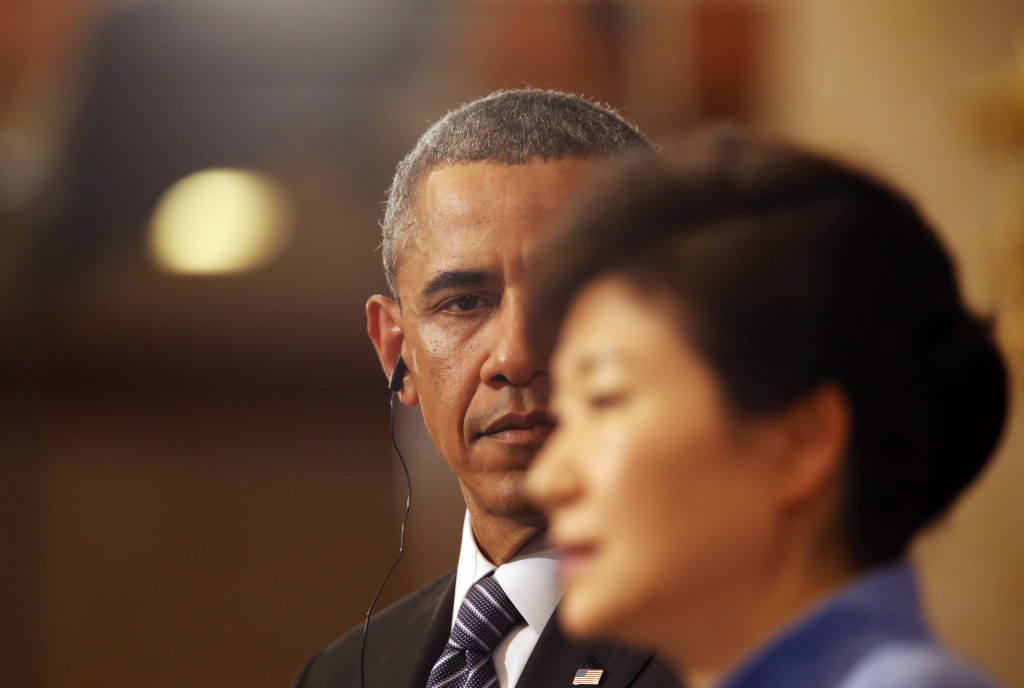- California Assembly OKs highest minimum wage in nation
- S. Korea unveils first graphic cigarette warnings
- US joins with South Korea, Japan in bid to deter North Korea
- LPGA golfer Chun In-gee finally back in action
- S. Korea won’t be top seed in final World Cup qualification round
- US men’s soccer misses 2nd straight Olympics
- US back on track in qualifying with 4-0 win over Guatemala
- High-intensity workout injuries spawn cottage industry
- CDC expands range of Zika mosquitoes into parts of Northeast
- Who knew? ‘The Walking Dead’ is helping families connect
Seoul hesitates on U.S. call on Russia

South Korea appears to be trying to avoid a direct answer to the United States’ call for it to join the international sanctions against Russia in the wake of the Ukraine situation.
By Yi Whan-woo
The government appears to be trying to avoid a direct answer to the United States’ call for it to join the international sanctions against Russia in the wake of the Ukraine situation.
The Ministry of Foreign Affairs said Friday it did not discuss specific roles the U.S. wants South Korea to play in those sanctions during the recent visit by U.S. Deputy Assistant Secretary of State for Counter Threat Finance and Sanctions Peter Harrell.
“Instead, we said we’ll continue to support the international community in trying to solve the conflict involving Russia,” a ministry official said on condition of anonymity.
His remarks were also reflected by the U.S. government’s statement that fell short of saying Seoul has committed to its request.
“We talk with South Korea all the time and coordinate with them on sanctions on a host of countries,” said Marie Harf, the State Department’s spokesperson, during a briefing Thursday.
“This was part of that normal outreach, but we believe that the more countries that impose costs on Russia, the more effective those sanctions are, the more people you get on board for them.”
Farrell’s Asia tour took place amid heightened pressure from the U.S. and European Union (EU) against Russia since its annexation of Crimea, part of Ukraine, as well as shooting down a passenger plane by pro-Russian rebels in the region.
Some call for the government’s caution on joining the sanctions over economic matters, while others urge a clear-cut pro-U.S. stance.
“Samsung, Hyundai, LG and Lotte sell electronics products, manufacture cars and also run hotels, as well as shopping malls, in Russia,” an economic expert said on condition of anonymity. “It’s important for an export-dependent country like South Korea to continue to maintain ties with Russia, an emerging market where we can sustain our economic-driven policy.
“The Russian Far East is where a 21st century-style Silk Road connecting South Korea, North Korea, China, Mongolia, Russia and Europe can be built. The region is also where abundant energy resources can be found.
Russia is Korea’s 10th biggest export partner, according to the Korea International Trade Association (KITA). And its exports fell by 9.9 percent year-by-year in the first quarter, amid growing concerns about the Russian economy.
“Those projects can’t be carried out without good diplomatic ties with Moscow. I think it’s important for us to not provoke Russia.”
Kim Ki-soo, a senior research fellow at Sejong Institute, said, “(Russian President Vladimir) Putin has gone too far in the Ukraine crisis and no international community would blame South Korea for joining forces with the U.S.”
He also said Seoul’s possible punitive measures against Moscow would not affect the six-party talks between the two Koreas, U.S, China, Japan and Russia.
The talks are aimed at denuclearization of the Pyongyang regime and peace on the Korean Peninsula.
“Russia does not have influence over North Korea compared to the past. And our decision, whatever it may be, will not bring much change to the negotiation table,” Kim said.
















